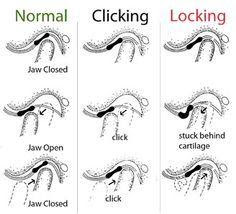This is a very common question that we get at Carolina TMJ. Sometimes new patients come in with no jaw pain or limitation in opening before a dental procedure or extraction, begin experiencing pain or limitation after a procedure. While you may think this is because your dentist did something wrong, the vast majority of the time, that’s not the case.
Reasons For Jaw Pain
Typically, jaw pain after a dental procedure is the result of a chronic or underlying jaw condition. Here are the most common reasons for jaw pain and how we diagnose these conditions:
- Trismus
This is the involuntary contraction of the jaw muscles, sometimes due to inflammation of those muscles. This inflammation will contribute to muscle irritation and spasm. Trismus is typically treated with muscle relaxers, NSAIDs, and jaw stretches. When this becomes chronic in nature, or the above treatments do not seem to do the trick, patients come to see me for relief.
- Temporal Tendonitis
Temporal tendonitis is the inflammation of the temporal tendon which connects the temporal muscle on the side of the head to the mandible. Symptoms of temporal tendonitis can include:
- Limitation in opening the mouth
- Pain/pressure behind the eye
- Temporal head pain that can radiate to the forehead
- Ear pain/congestion
- Pain/swelling in the cheek
- Teeth sensitivity
Occlusal wear (loss of tooth structure) on a patient’s teeth, possible arthritis occurring in a patient’s joint, or a history of clenching can all contribute to temporal tendon inflammation. This condition is harder to treat through medication alone, and we have several ways that we treat this condition successfully in our practice every day. Proper diagnosing is crucial as a first step, as it allows us to create a more effective treatment plan.
- Arthritic Joint
It is possible that you had an arthritic process already occurring in one or both of your temporomandibular joints, and the dental procedure aggravated both your joint and the soft tissue supporting your joint. Your temporomandibular joint is used more than any other joint in your body, and it can develop the same issues as your other joints, including arthritis.
We have a protocol we follow for most of our patients with arthritic joints. It can involve custom orthotic therapy, injection therapy, and/or medication, and there are instances that we will refer a patient for further x-rays or MRI.
- Closed Locked
Although it is a rare occurrence, it is true that a patient can become locked after a dental procedure. The reason this happens is based upon how the patient’s joint relates to the articular disc prior to the dental appointment. Here is the ideal joint/disc relationship and a view of the anterior displaced disc/joint:

Many patients come in with a disc anteriorly positioned to the joint without actual joint pain. These are patients that have clicks or pops when opening/closing, chewing, etc, but have no pain with the click. It is usually inflammation or a change in the shape of the disc that causes a patient to lock closed (the joint not able to reduce or click onto the disc).
When this occurs, pain will follow along with a limitation of opening and movement of the jaw. Often these patients share that their jaw clicked prior to the dental procedure, but now no longer clicks and they are now very limited in opening and have moderate to severe discomfort when attempting to open.
Let Dr. Davidian Relieve Your Jaw Pain
As you can see, there are many reasons why your jaw may now feel discomfort after a dental procedure or extraction. If you have attempted to resolve this discomfort and have been unsuccessful, you are not alone. We’re here to help you find relief. You can contact our office and schedule your appointment by calling us at 919-782-9955 or requesting an appointment online. We look forward to meeting you and helping you become pain free.

No comment Add yours.